Telling Someone Else's Story is Hard
Letter #36: So I guess I'll keep telling my own until I can figure out an elegant way to expand my repertoire.
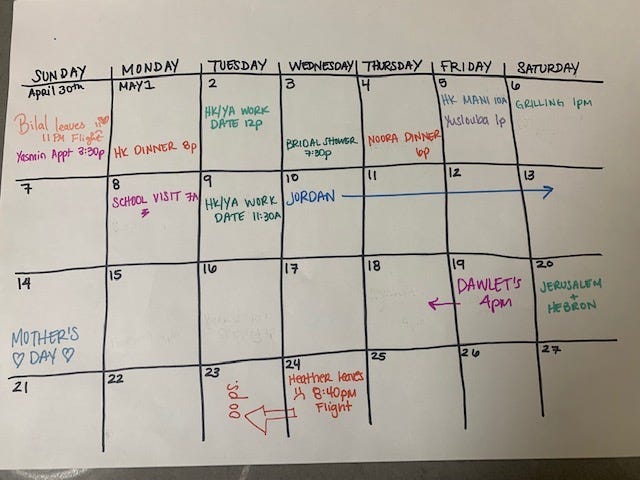
5/14/23
I am teeming with new stories to share since I’ve reached Palestine-Israel. The history of my family here goes way back, and because they live in such a politically volatile part of world, my brain is exploding with information to share. Real facts. Not just what I’ve seen in the news or on social media back in the US, but real stories, real photographs, and even some real experiences by yours truly.
I’ve been saving questions I wanted to ask Kathy, Ismael, and Yasmin in person when I got here. And, over the course of the last month, almost all of them have been answered, and then some. When Kathy, especially, began telling me stories over the past 3 weeks, I was on the edge of my seat, peppering her with questions, eager for the end result of each chronicle. They were so captivating that I was pumped about how much content I had to share with the world—the story of how Kathy & Ismael met, alone is so fascinating. And I’d have to work hard to explain the reality of many of the Palestinian people living in what is now called Israel without sounding ill-informed or biased—info based on true facts, people.
So today I sat down to write out the story of how Kathy and Ismael met. Of how an American woman who grew up in a Christian home came to fall in love with a Bedouin Palestinian man who grew up Muslim. Of how both scholarly people have spent their lives dedicated to work that aims to elevate and improve the lives of Palestinians living under an occupation.
And yet, today when I sat down to write out the story that Kathy had shared with me in such detail over the past few weeks, I totally failed. The details were fuzzy, the timelines weren’t making sense, and it began to sound like an 8 year old was doing the typing.
Telling someone else’s story is really hard.
Up until this point I’ve been sharing stories from my own perspective. I can easily recount the events in vivid detail, with specific timelines, highlighting each story by my own feelings at the time. It’s come so easily to me that the writing has begun to evolve and I’ve learned how to improve my own storytelling.
I guess I was naive in thinking it would be just as easy to share someone else’s story. At first I felt defeated because I’ve been thinking this is something I want to be involved in more seriously—telling my own and others stories. I was about to give up and close my computer when I reminded myself that I DO feel confident telling my own stories. So if I want to do it for others, then it’s just something I need to take the time to learn how to do. I just won’t be able to bang out a quick newsletter recounting these outside stories—I’ll have to go back, ask very specific questions, record the answers, and try again.
So I wrote down some interview questions to ask Kathy during our drive to Jerusalem tomorrow, in hopes that I can make a new attempt to tell their story at a later date.
Writing is so subjective, what if the way I retell the story isn’t how they’d want it retold? Even if I have my family review and edit what I’ve written, will I have done it any justice? Does my storytelling from their perspective just fall flat? I gently reminded myself that I’m good at several things, but I don’t have to be good at all things. Maybe I am discovering a new gift of writing down my own story, but it’ll just have to continue being my story—not someone else’s. But we are so much more than our individual experiences. We are affected by those we grow up with, those we work with, our ancestors, the people we develop relationships with along the way. Their stories inevitably become our own. And, so, how else can I explain how I’ve become sympathetic to my unique understanding of the Palestinian story in the Middle East, without sharing the stories of over four generations of the family (by marriage) that I have here? Isn’t me spending a month here to learn from them—and experience some of their pain first hand—now my own story?
Well, this is more my way of talking out loud than of actually reaching any clear conclusion. And I can’t guarantee how or when I’ll be able to tell more of the stories here, but I’ll let you know if and when it happens. Until then, I’ll continue to share my own experience of this place.
I had assumed I’d have tons of free time to work on personal stuff while I was were—an hour of meditation every morning, an outdoor run, plenty of writing, reading, and job-hunting. I’d have time to learn a language and take some free online courses for subjects I’m interested in learning more about.
Yikes, how wrong I was.
The social environment here is nothing like I’d ever experienced before. Ismael’s father lives in the house next door, just across the driveway. His sister, Yusra’s family lives in the house behind that. Behind that is Hagar’s family’s house. And behind that lives sister Aziza’s family, followed by Zeyneb’s family, his brother, Musa’s family, then Wafaa’s family, and Nami’s families. Further into the village lives Noora’s family, and in a town 20 minutes away live Dawlet’s and Fatme’s families.
If you do the math, nearly 80% of the families live within a 5 minute walk of each other. The others are within a short drive.
They’ve built this beautiful ritual of spending time with Grandpa around the Islamic call to prayer times. The call times follow the rise and setting of the sun. While I’m here, the calls come roughly around 4:30am (sunrise), 12:15pm (noon), 4pm (mid afternoon), 7:30pm (sunset), and 9:15pm (nightfall). Some days we gather to have lunch together in the salon of Grandpa’s house around 2pm. Then everyone disperses for a siesta. We gather again with Grandpa as early as 5:30pm and socialize until the sunset call. Again we disperse, maybe eating a light snack for dinner or going back down around 8pm if someone prepared a family meal. We socialize again until the nightfall prayer, and then, again, everyone disperses. Some nights, there is another gathering at Wafaa and Tawfik’s house, which I have lovingly dubbed the “after party”. This socializing may continue on until 11pm.
Depending on the day, you may be socializing with family members 2-4 times a day. There were some days we had breakfast, lunch and dinner together. At any one time 2-12 people might be downstairs visiting with Grandpa.
Grandma had passed away the previous year, but the family has always maintained this ritual of spending time with the elders. This is in stark contrast with what many US families are used to, where the the elders that can no longer live successfully on their own, move into assisted living or nursing home facilities. (I use the word “many” US families here because this is not true for all families).
Because I saw the same family members so frequently, it was easy to develop relationships with them—even despite the language barrier. The social invitations came flying in—dinner at this auntie’s house, this family member’s wedding, visiting this school or that university, afternoon walks or morning runs with the cousins. Some of the family members were worried I’d get bored in this small town, but no way. My days were full of socialization, and I desperately searched for pockets of time were I could get some writing done. But it was so fun.
The aunties have a sassy sense of humor. Their conversations, all spoken in rapid Arabic, either sound like they’re fighting or laughing with one another. It was almost always laughing. They were very affectionate with me, giving me hugs every time we saw each other, and two kisses on the cheek. I sat sit side by side on the couches in the salon with them, allowing myself to become just another ordinary member of their family. They are constantly baking up traditional Palestinian dishes for me, and providing homemade sweets for the family.
Uncle Musa takes care to make sure we are all well fed with burgers and schnitzel from his new corner joint, Be Burger. He and Tawfik took to barbecuing lamb, chicken, and beef for us on several occasions. Uncle Tawfik arranged and accompanied us girls on any excursions we wanted to go on, including a 4 day trip to Jordan, a day trip to the Hebron in the West Bank, and my pickup and drop-off at the airport.
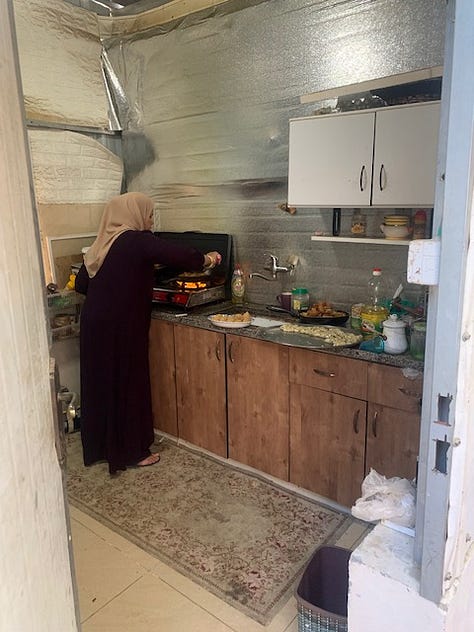
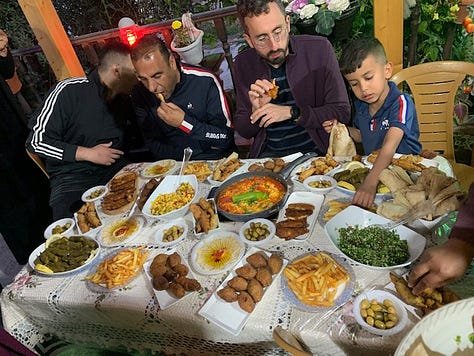
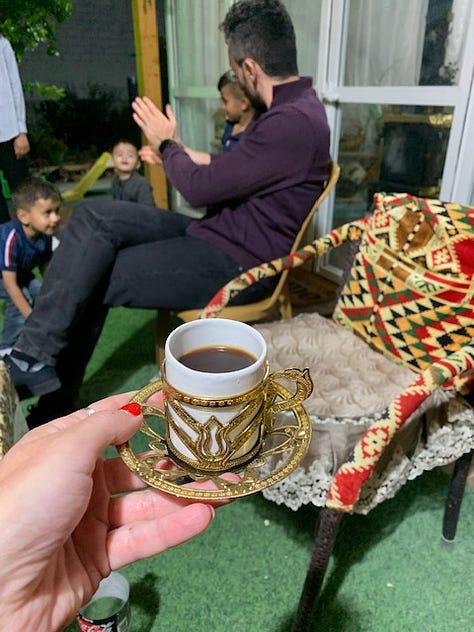
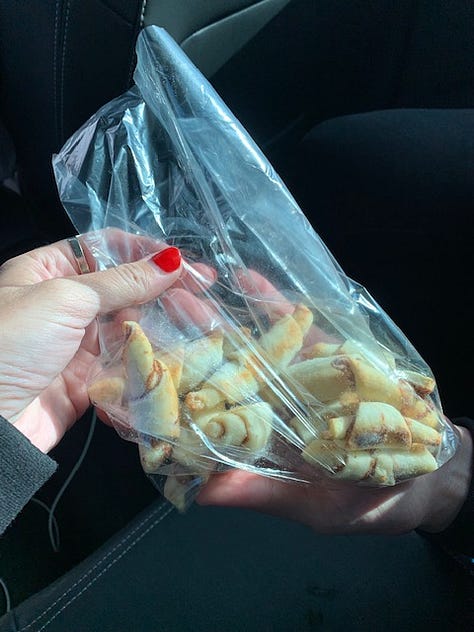
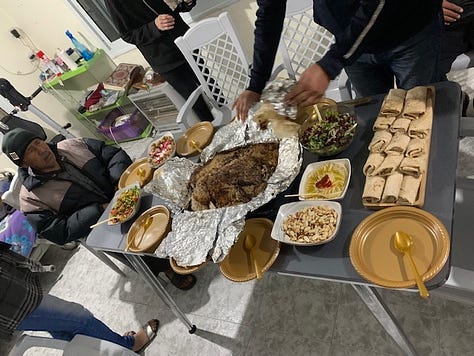
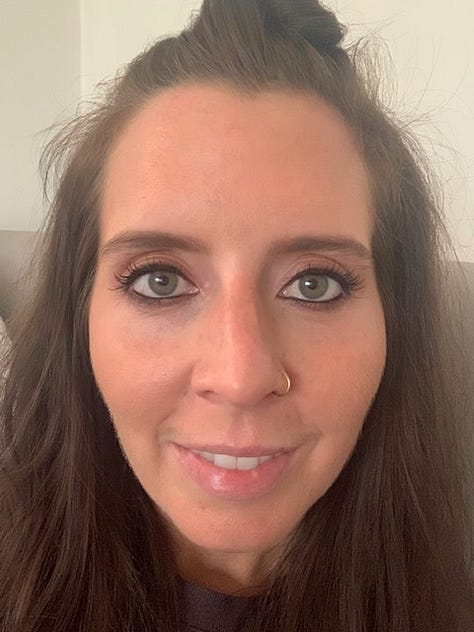
And so, even though I wasn’t getting much alone time, I was thrilled to get so much love and attention in this new family setting. It felt like every day something fun was planned, and nearly every night I fell into a deep sleep in the lower level bedroom of Kathy and Ismael’s house, being woken up only briefly by the 4:30am call to prayer.
And the generosity of these families is also unlike what I’ve experienced before. Kathy shared with me that in traditional Bedouin culture, if a guest enters their home, they may choose to stay for as long as they want. There is a three day rule in which the host cannot ask any questions to the guest. Not only does this help make the guest’s journey easier, but Kathy explained sometimes the guest may be extremely weary, or escaping from some danger, and so by giving the guest the grace of not answering any questions during those 3 days, the host offers a true refuge.
The same goes for payment. My family would not easily allow me to pay for groceries or other items when we went out. Sure, this is customary of many families to treat their guests in such a manner, but I was staying for a month! (I will say, though, my parents are the same way when I’m home). When I tried to pay for my lot of the food at the local grocery store (the only one open on Saturdays since the rest of the country is shut down for the Jewish Sabbath), Kathy and Yasmin refused, siting that payment from a Bedouin guest will not be accepted until after 145 days. 145 DAYS?! Why would any guest ever leave?! 🤣 I’ve lived independently for many years so I’m used to paying my way through everything. It wasn’t so easy to accept the generosity without feeling like I was taking advantage of them (I wrote more about that here). But I found ways to return the kindness by cooking family meals, keeping up with the dishes, and doing some light cleaning around the house. Even though a guest isn’t meant to cook or clean during their stay, I kept reminding everyone I was family and had to earn my keep.
Any loneliness that began to creep in during my time in Vietnam or Nepal, has immediately dissipated as I’ve sunk into the new routine here. It wasn’t long before Kathy, Ismael, Yasmin and found ways to tease each other through the day. We indulged in some extended family gossip, cooked meals together, baked cookies and pies together, and fell into deep conversation around the kitchen island, sometimes lasting up to 3 hours.
Every Saturday, some of the family members drive to the cemetery with Grandma is buried. I accompanied them on that first Saturday of my visit, curious about their ritual. I covered my hair with a black scarf out of respect for this religious site. They took two large bottles of water. One was used to wash off the grave—Muslims keep very modest graves—outwardly lavish displays are discouraged. The other bottle of water was used to fill the holes that were carved out at the head of the grave for birds to come and drink. The remainder of the water was used to water the small olive tree that had been planted at the base of the grave. We stood quietly as the family members said prayers over the grave, and headed back into town to pick up some sweets at a local shop.
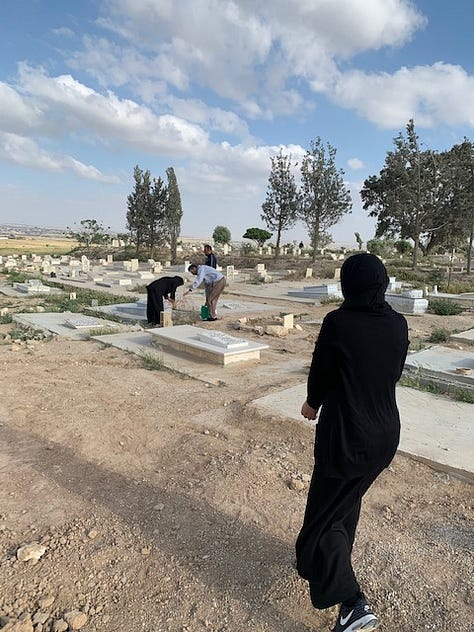
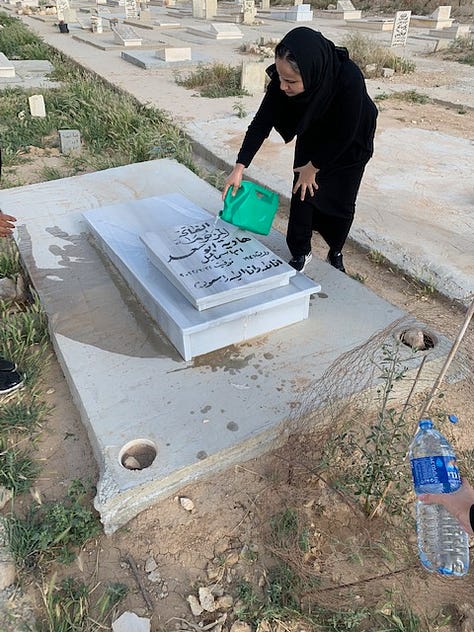
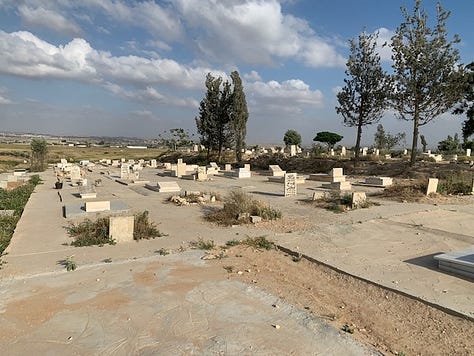
Quick Update: Sadly, I leave Palestine today for Tirana, Albania. I have a quick 9-day tour there before heading back to the US for a month!
Hey! Would you like to connect over creativity, self-growth, and problem-solving? Or just to have a virtual glass of wine or mocktail? Please book a time on my Calendly for us to chat! I can’t wait to see you. XOXO.
If you’re enjoying On the Road, please share with others who you may think would enjoy as well! As always, I love reading your comments and feedback. If you're not already subscribed, please click the button below so I can continue sending you weekly-ish stories and lessons while I travel. 🚙




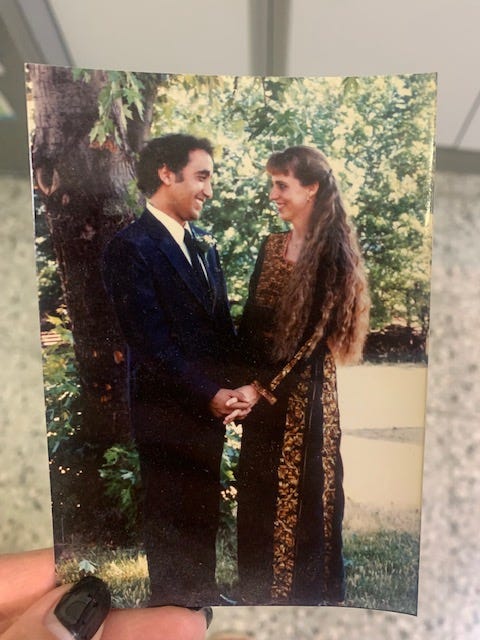
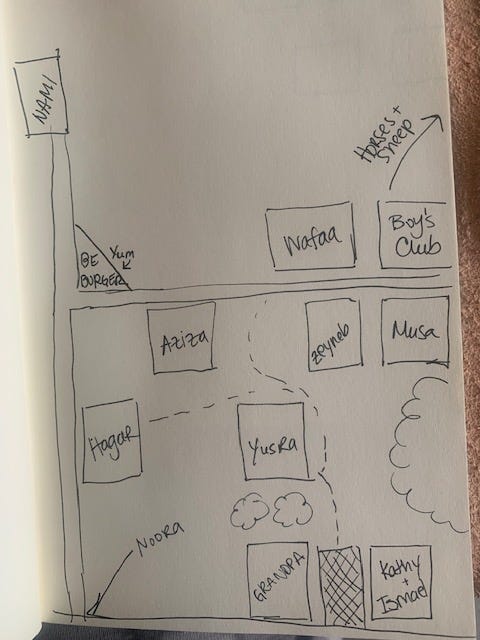
I miss you, when I start read the article I felt the feeling of those days again.
You should back Jack 🤎🤎🥲!
(Come back Jack)
I even feel like I’m re-living those fun days, as you recount them. We had a wonderful time with you, and we’re all looking forward to your next visit. Ma a-salama (go in peace) ❤️.